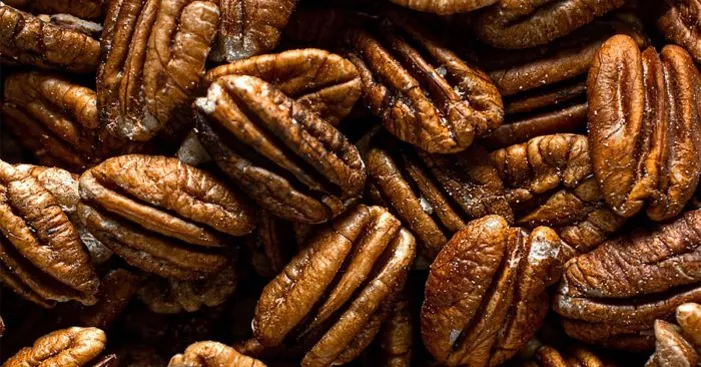Table of Contents
Pecans are small shelled nuts that resemble walnuts with some differences.
In North America, pecans are very famous in baking as they are the main ingredient for the famous “pecan pie” during Thanksgiving.
These 1.5 inches long nuts are very nutritious as they are rich in essential nutrients that boost energy.
However, pecans are not an exception as they have possible side effects some people may experience after eating them.
In this article, we gathered all the information you need to learn about the benefits of pecans, their nutritional composition, and their possible side effects alongside tips on how to buy, consume and store them.
But first, let’s get to know the history of pecans!
Pecan: a little historical background
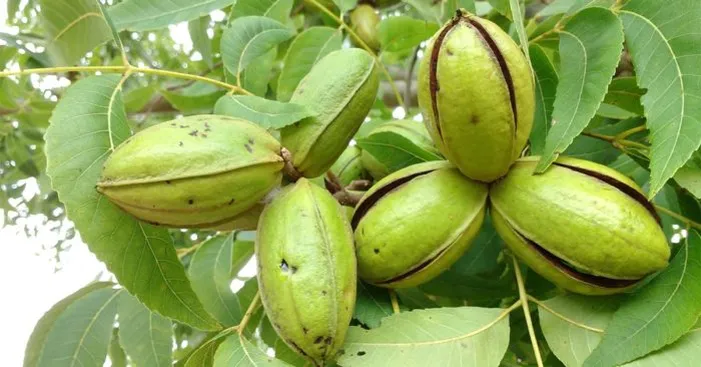
Evidence suggests that pecans were consumed more than 8000 years ago in nowadays Mexico, Mississippi, and Texas.
Historians believe that indigenous tribes of North and South America used pecans frequently in their diets.
The term pecan comes from the word “pakan” which comes from the Algonquin language used by native tribes of Ontario and Quebec.
In that language, “pakan” literally means “you need a stone to crack the nut” or “hard-shelled nuts”.
Pecans also served as a currency during the colonial era when people used them in the same way as money.
The cultivation of pecans only started in the 18th century specifically in Mexico and the USA.
In 1919, the tree of pecans became the emblem of the state of Texas.
Even to this very day, those Easter regions are still the top producers of pecans worldwide.
Difference between pecan and walnuts:
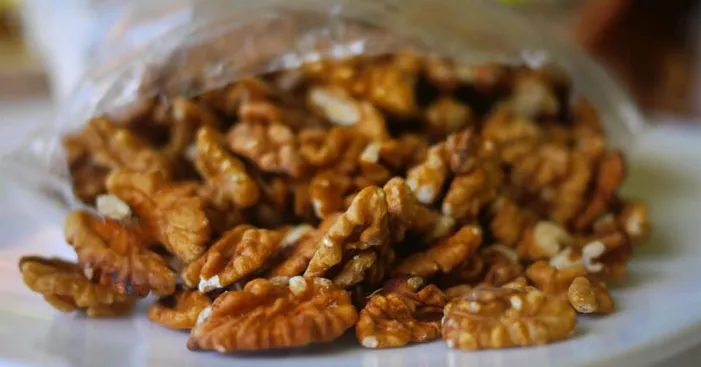
Pecans have a brown shell throughout the stages of growth, unlike walnuts which have a white shell that gets beige when it matures.
Walnuts’ shape tends to be more like a ball dissimilar to pecans that have an oval shape.
Also, the shell of pecan is smooth and uniform to the touch and doesn’t have the harder and rough walnut shell properties.
Pecans are very similar in Northern and Southern America while walnuts are more popular in China, Turkey, and Iran…
Due to the environmental differences, Walnuts dominate the East of the world and Pecans dominates the West.
Pecan nuts are full of mono-unsaturated fats and contain more fibers and proteins than walnuts.
On the other hand, walnuts offer more polyunsaturated fats mainly in the form of alpha-linoleic, linoleic, and oleic acids.
In addition, pecan nuts provide slightly more fibers and a little bit more manganese.
Similar to Walnuts, they are richer in copper, potassium, and sodium and they are the richest nut in terms of antioxidants.
Pecan benefits and side effects:
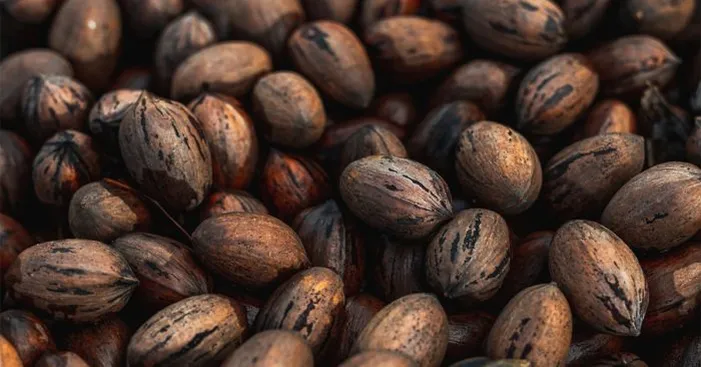
Pecan nutritional values:
Pecans are full of protein and dietary fibers and many amino acids with low saturated fat.
Also, they are a good source of many minerals including copper, manganese, zinc, phosphorus, and magnesium.
In addition, pecans contain a wide variety of vitamins, especially of the B-group.
These nutritional data counts for a handful (1oz, 28g) of pecans:
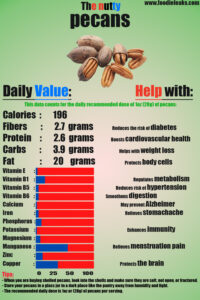
- Calories: 196
- Fibers: 2.7g
- Protein: 2.6g
- Carbs: 3.9g
- Fat: 20g
- E Vitamin: 3%
- B1 vitamin: 16%
- B5 vitamin: 5%
- B6 vitamin: 5%
- Calcium: 2%
- Iron: 5%
- Phosphorus: 10%
- Potassium: 2%
- Magnesium: 8%
- Manganese: 55%
- Zinc: 12%
- Copper: 38%
Pecan benefits:
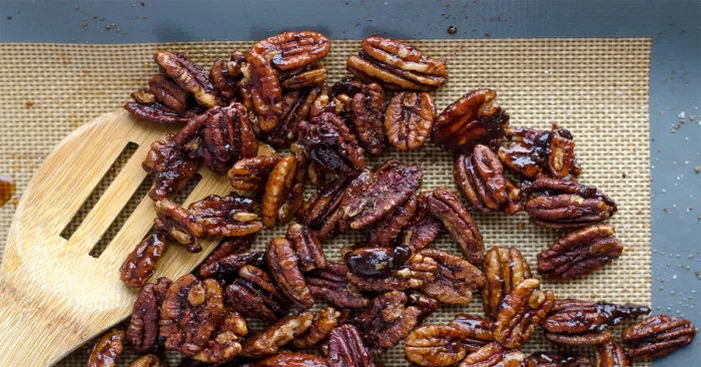
With all these nutrients, pecans are very useful to boost the overall health with so many benefits including:
Good for cardiovascular health:
Pecans are a good source of unsaturated fats such as Oleic acid and other antioxidants.
One serving of pecans (1oz, 28g) offers about 10% of our daily need in unsaturated fats.
That combination works on exterminating bad cholesterol and prevents blood clots.
Good for weight loss:
Consuming pecans will also help us reach the daily needs of B vitamins.
In fact, pecans contain thiamine (B1), Pantothenic acid (B5), and pyridoxine (B6).
Just a handful of pecans provides more than 15% of our daily need for vitamin B1.
These vitamins increase the overall body metabolism which results in burning more calories.
Also, it contains a low amount of sugar and unsaturated fats which doesn’t cause weight gaining.
Improves digestion:
One of the essential nutrients that act directly on our digestion is the amount of dietary fiber we consume.
Fibers go through the body undigested but they are the main component of feces.
They also ensure the smooth transport of body waste throughout the intestines.
Specialists proved that a diet rich in fibers provides a much easier bowel movement.
Consuming 1ounce of pecans supplies the body with 10% of its daily need in fibers.
In addition, they prevent hemorrhoids by cleaning the digestive tract and improving colon health.
Good for the skin:
Zinc and phosphorus are two minerals that prevent skin aging and wrinkles.
In fact, zinc has anti-inflammatory properties which help fight inflammatory skin issues such as acne and eczema.
It also protects the skin from UV radiation and helps the skin recover after an injury with minimum scars.
On the other hand, phosphorus is the second most abundant mineral in the body.
Among the many roles of phosphorus, it is responsible for tissue regeneration and that includes skin cells.
As we grow up, our skin is faced with external and internal harmful substances.
This results in skin cells dying or getting infected and it is essential to give our body what it needs to regenerate them.
In addition, phosphorus plays a key role in preventing skin problems thanks to its antioxidant properties.
Protects the brain:
Generally, diets that offer enough vitamin E are linked with lower risks of Alzheimer’s and Parkinson’s.
Just a handful of pecan offers about 4% of the daily need in vitamin E which can help reach the goal.
In fact, vitamin E found in pecans along with other antioxidants can help reduce oxidative stress and protect brain cells.
Certainly, there is no food that is a complete source of nutrition on its own, but the idea is to diversify and get our daily needs from different sources.
In this same mindset, including a moderate amount of nuts as healthier snacks in our diets would give us the boost we need nutritionally.
Reduces menstruation pain:
Pecan is very rich in essential nutrients that can reduce muscle cramps and mood swings.
Among those nutrients, pecan offers more than 50% of the daily need in manganese.
This mineral has strong antioxidant properties that can reduce inflammation and therefore reduce pain symptoms.
Based on a study, manganese shows promising results in reducing pain and boosting the mood before and during menstruation.
Other benefits of pecans:
- Reduces the risk of hypertension.
- Improves the immunity system.
- Protects body cells.
- Help fights free radicals.
- Relieves stomachaches and regulates gastric enzymes.
- Enhances dental health.
- Reduces the risk of diabetes.
Possible pecan side effects:

This is probably the same for every type of food, it is safe to eat any type of food however some people may have side effects.
Kidney stones:
Kidney stones are one of the most painful conditions a person can suffer from.
Some people are advised to have an oxalate-free diet, especially those who had kidney stones, and removed them.
This is because consuming oxalate may risk kidney stones recurrence (also called urinary lithiasis).
Oxalates are natural compounds that exist in many types of food such as sweet potatoes, soybeans, oranges, and pecans.
Because of that, it is best for people who had kidney stones before to avoid consuming pecan flour, pecan milk, and raw pecans.
Pecan allergy:
Usually, people who are allergic to nuts such as almonds or walnuts, are more likely allergic to pecans as well.
People allergic to pecans may have symptoms including:
- Vomiting.
- Sore throat.
- Tongue swelling.
- Dizziness.
- Shortness of breath.
May increase weight:
Generally speaking, pecans mostly contain unsaturated fats and are low in sugar.
This makes them very useful for people who want to lose weight.
Nonetheless, this is only the case when we consume pecans in moderate amounts.
For instance, consuming sub-product like pecan milk may risk going overboard, especially with calorie intake.
Just 1 cup of pecan flour contains more than 350 calories and about 50% of our daily need in fats.
Also, 1 cup of pecan milk provides 320 calories and around 35% of the daily need in fats.
On the other hand, regular milk contains just 100 calories and 1% of fats per cup.
Because of that, some people may think they can consume pecan milk in the same amount they consume regular milk.
That would definitely result in more calories and a higher risk of gaining weight.
Therefore we need to make sure we consume pecan milk moderately with not more than 3.5fl oz of milk per serving.
How to get pecan benefits?

The most common way to consume pecan benefits is by snacking on them raw.
You can also enhance pecans’ flavor by roasting them for 3 to 5 minutes in a medium heat oven or in a hot pan (without oil).
Nonetheless, you can use pecans crushed or whole in both savory and sweet dishes.
For instance, you can sprinkle crushed pecans on salads or as part of chicken and turkey stuffing.
In addition, crushed pecans add a perfect taste to ice cream, pies, cookies, and brownies.
Buying pecans:
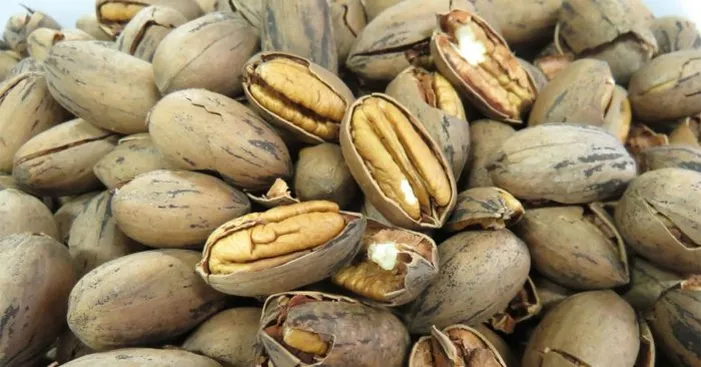
The first thing you need to ensure is that pecan nuts are not dry, you can check that by tasting a pecan.
In case you are buying shelled pecans, look into the shells and make sure they are soft, not open, or fractured.
Also, shake the pecan and make sure the inner nut doesn’t move inside or make noise.
This is because nuts and shells grow proportionally together, and if the nut moves inside this means it is dry and old.
Pecans mature during fall and the freshest ones you can find almost 3 weeks after the harvest.
However, you can also find pecans unshelled even though those ones usually have a shorter lifespan.
To choose the best-shelled pecans try to avoid the ones in bulk and choose the airtight containers that have an expiration date.
Storing pecans:
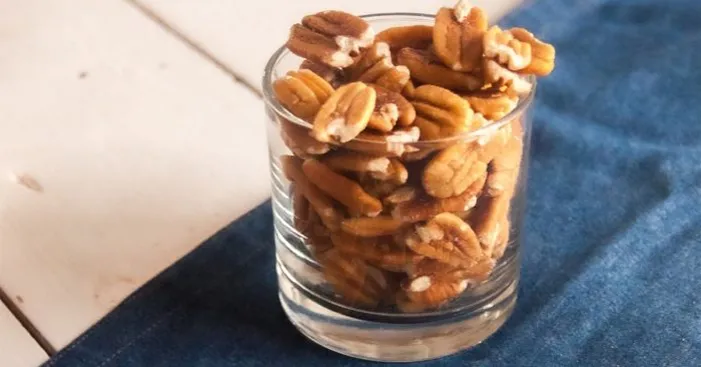
This type of nut tends to go rancid quickly in humidity and exposure to light.
Because of that, the most optimal storing condition is to store your pecans in a glass jar in a dark place like the pantry.
By keeping them away from light and humidity, pecans can last up to 6 months.
As for pecan recipes, these nuts last longer than the other ingredients so you can store these dishes in the refrigerator like you usually do.

